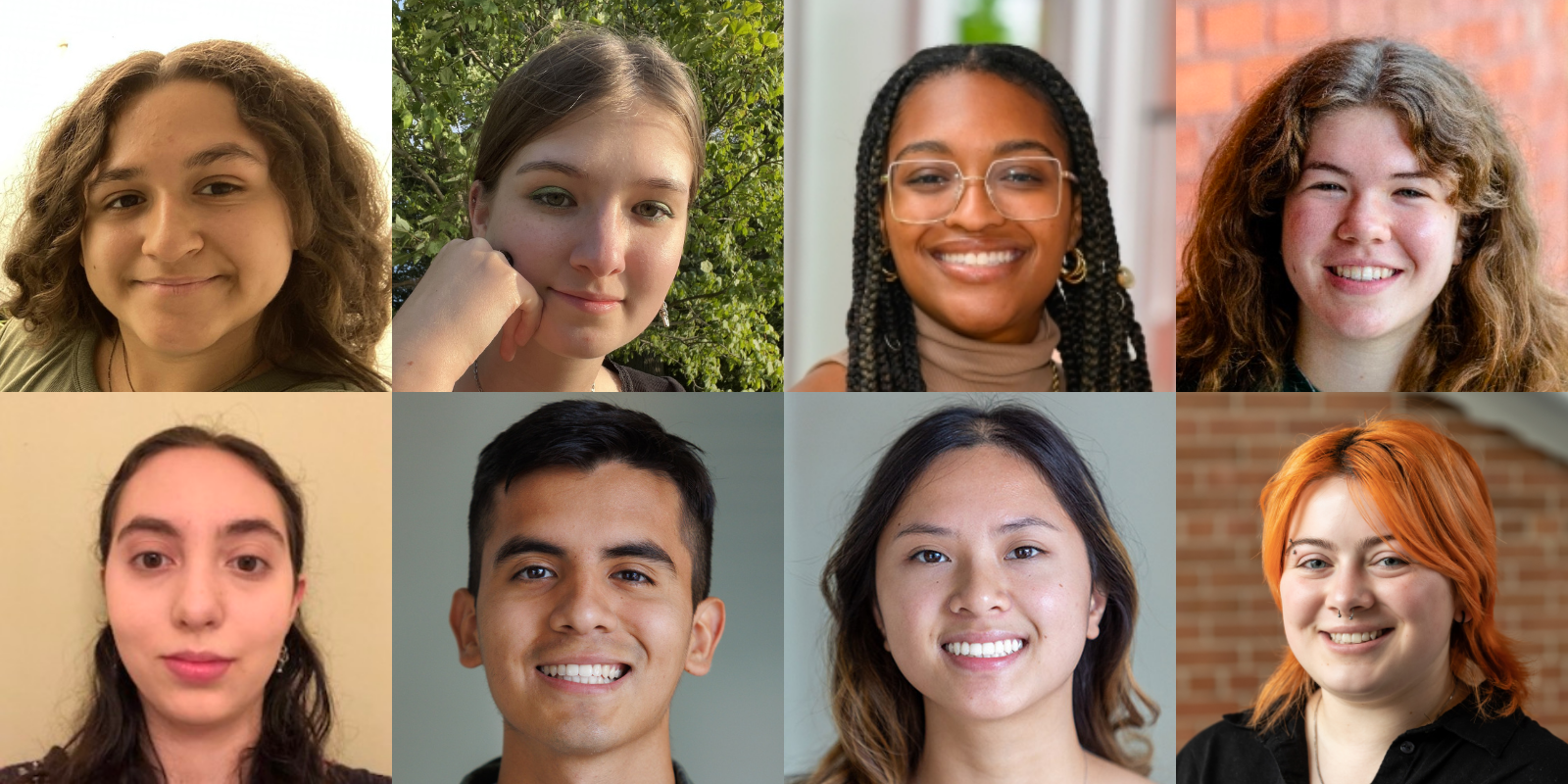
The Great Lakes Bioenergy Research Center hosted fourteen REU (Research Experience for Undergraduates) students in summer 2023. We asked some of the participants about their motivations for participating in the GLBRC REU program, the best parts of their summer, and what advice they have for future REU participants.
Check out the GLBRC Instagram to see videos highlighting their time with us!
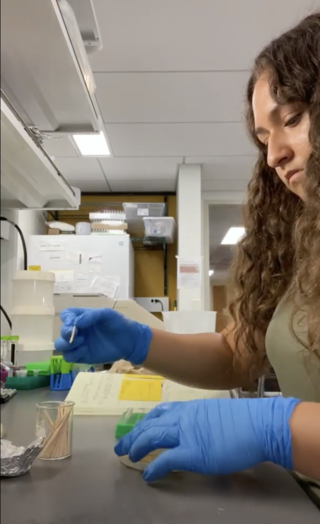
Amayrani Olvera
This summer, I'm working on cloning regulatory elements in sorghum with Bjoern Hamberger. I'd say the most exciting part about this research opportunity is getting to meet all different kinds of people and professionals, all within their respective backgrounds. I'm hoping to gain more hands-on skills and be able to practice and refine technical skills.
The most fun part has been meeting lots of really cool people and having all these really fun experiences–getting to visit the lab and the greenhouses and really getting to see how research takes place.
This experience has been really good for me because it combines the agricultural aspects that I kind of come from, like a small ranch and farm town, and combines the higher education plus research plus sustainability. It's that perfect combination that brings both those aspects of my life together.
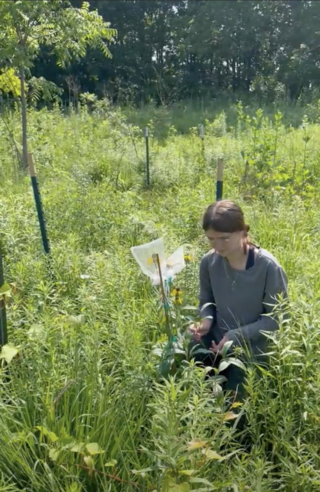
Molli Thibodeau
This summer, I'm working with Katherine Hulting, a grad student in Nick Haddad’s lab, to understand how habitat fragmentation is affecting plant-pollinator interactions and restored prairies. My personal project right now is to see how prairie management techniques are affecting non-native species abundance. The most exciting thing about this particular research opportunity is how it could possibly help us better understand how prairies can be beneficial in addition to being a biofuel crop, because they can also provide pollination services. This summer, I'm hoping to gain knowledge of field survey techniques and other data collection techniques and more experience with GIS.
Advice for people coming after me–definitely just come at it with a mindset of being able to kind of go anywhere, do anything. Try to ask as many questions as you can and to as many people as you can, basically to learn as much as you can and come into this with an open mind.
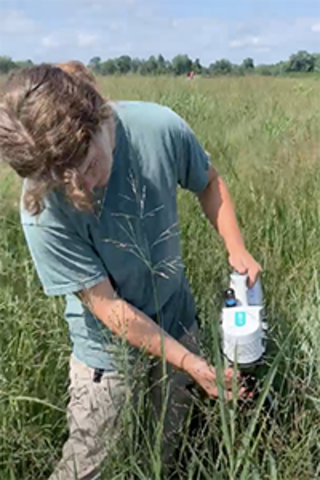
Maggie Jones
I've been working on measuring crop photosynthetic activity at different light levels to create some light response curves of crops. This project is expanding on a project that I did last summer, working here at the Kellogg Biological Station (KBS) studying the Rain Exclusion Shelter project. The shelters are used to simulate drought conditions to try and predict how crops will behave in those conditions, especially since climate change has been expected to cause increased drought in the future. We found that the shelters actually block a significant amount of light, so we want to determine if the decrease in light actually affects their photosynthesis.
The most exciting part of this research is that I can really find the joy in being outdoors and also feel more connected to those systems and learn a lot more about the agricultural systems that keep our society running. I'm mainly hoping to gain research skills at a bunch of different steps in the scientific process, and I especially like learning more about data analysis, project management, and scientific writing. I've been excited to work with a bunch of amazing researchers from across the KBS community.
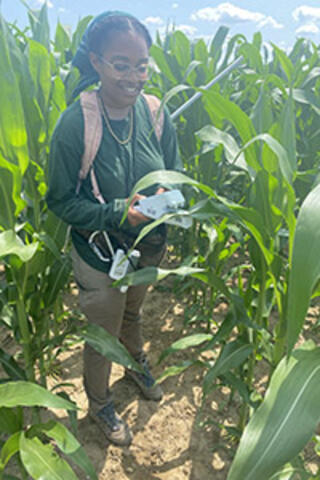
Julia Seays
I'm working on stomatal conductance of corn and switchgrass at the Kellogg Biological Station. For photosynthesis, carbon dioxide (CO2) has to come into the leaf. Stomatal conductance is basically how easy that gas can come in and out of the leaf, so we really want the CO2 to be flowing inward. We want to see which one has the better stomatal conductance so that when we mass produce these plants for bioenergy, which one is going to also help mitigate climate change as they're being grown and produced. What's most exciting about this research is that it is based on field research, and it's the first research I’ve ever gotten to do independently. I really think it's really exciting to go out in the field by myself, dig through everything, collect the data and process the data from day one and just do everything on my own to really get an understanding of the work that I'm doing.
What advice would I give? I would say talk to everyone and anyone when it comes to research, everybody loves talking about their research and showing what they know because they've spent most of their lives doing it, and I feel that you can learn so much just from the people around you, even outside of your mentor.
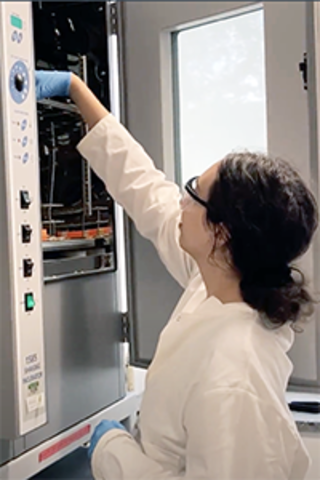
Sydney Buchsbaum
This summer, I’m working with a bacterium called Zymomonas mobilis in Michaela TerAvest's lab with Magda Felczak, and I am trying to get it to eat some cheaper substrates, namely formate and acetate, because right now it really likes glucose and nothing else.
I really like learning about all the equipment and learning how to use it properly because this is my first time in an actual research lab. I'm trying to figure out whether biofuels and sustainability is the career path I want to go down. I've been interested in it for a very long time since I first learned about it in fourth grade, but I haven't really done much with it yet.
My advice is to not be afraid to make mistakes because you will make them, and the important part is learning how to overcome and not make the same mistake twice.
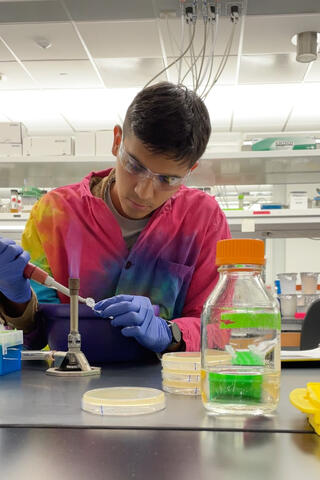
Salvador Castillo
This summer, I am working on a galactose metabolism project at the Wisconsin Energy Institute in Chris Hittinger's lab, understanding the evolutionary history of a metabolic pathway in yeast and testing out different genes within that pathway in Saccharomyces cerevisiae. What's most exciting about this research opportunity is that I get to learn skills in molecular biology and I get to understand what it means to be in a lab.
I'm hoping to gain lab skills and skills in communicating the science that I'm doing and understand whether or not I want to attend graduate school and expand the skills I have into that.
Advice that I would give would be to try to talk to as many people as you can, whether it be a professor or another student or other lab mates within your lab. Just talk to anyone and everyone within this program.
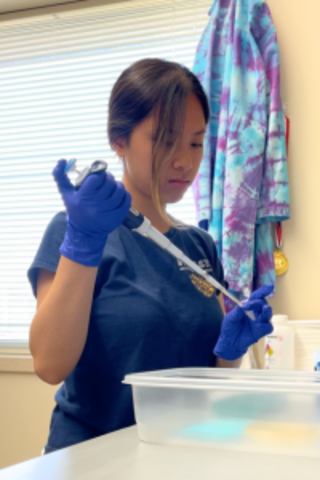
Janice Tran
This summer I’m working in Jason Peter’s Lab at the School of Pharmacy with a bacteria called Zymomonas mobilis and how it can be used as a competitive biofuel producer. I was interested in this research because if we can learn more about biofuels that outcompete fossil fuels, we can make the world better.
This summer I was really looking forward to improving my laboratory skills, gaining new ones, and meeting a diverse group of people in my cohort who come from very different backgrounds.
I think good advice would be not to engross yourself too much in your research. There’s lots of things to do here in Madison and you can make a lot of good friends. You can do things like kayaking or walking on the trails.
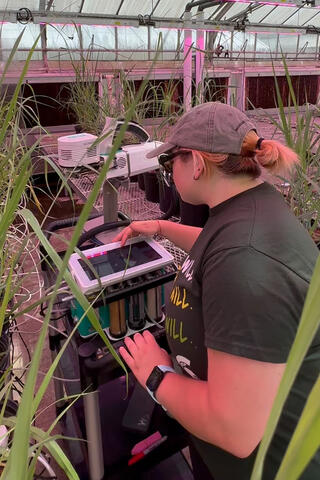
Veronica Pargulski
My project involves drought experiments with switchgrass in the greenhouse. We are taking measurements every week to measure the photosynthesis activity and the gene expression, and at the end of the project, we will harvest and measure the biomass and assess the quality of the biofuel. So the aim of this is to help predict for future drought years what the yield of switchgrass will be for biofuel.
The most exciting part about this experience is that I'm involved in a very large network of scientists and researchers who are really passionate about sustainability in the future, and I'm really glad I get to be part of that and have so many resources and people who I like. Some advice is to have good communication with everyone you're working with that can help things go a lot more smoothly.